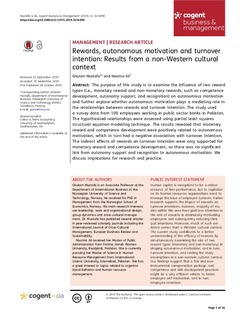Rewards, autonomous motivation and turnover intention: Results from a non-Western cultural context
Journal article, Peer reviewed
Published version
Permanent lenke
http://hdl.handle.net/11250/2622098Utgivelsesdato
2019Metadata
Vis full innførselSamlinger
Originalversjon
10.1080/23311975.2019.1676090Sammendrag
The purpose of this study is to examine the influence of two reward types (i.e., monetary reward and non-monetary rewards, such as competence development, autonomy support, and recognition) on autonomous motivation and further explore whether autonomous motivation plays a mediating role in the relationships between rewards and turnover intention. The study used a survey data from 100 employees working in public sector banks in Pakistan. The hypothesized relationships were assessed using partial least squares structural equation modelling technique. The results revealed that monetary reward and competence development were positively related to autonomous motivation, which in turn had a negative association with turnover intention. The indirect effects of rewards on turnover intention were only supported for monetary reward and competence development, as there was no significant link from autonomy support and recognition to autonomous motivation. We discuss implications for research and practice.

